General
Minister Janet Museveni Launches Emerging Leaders Program at Makerere University
Published
1 year agoon
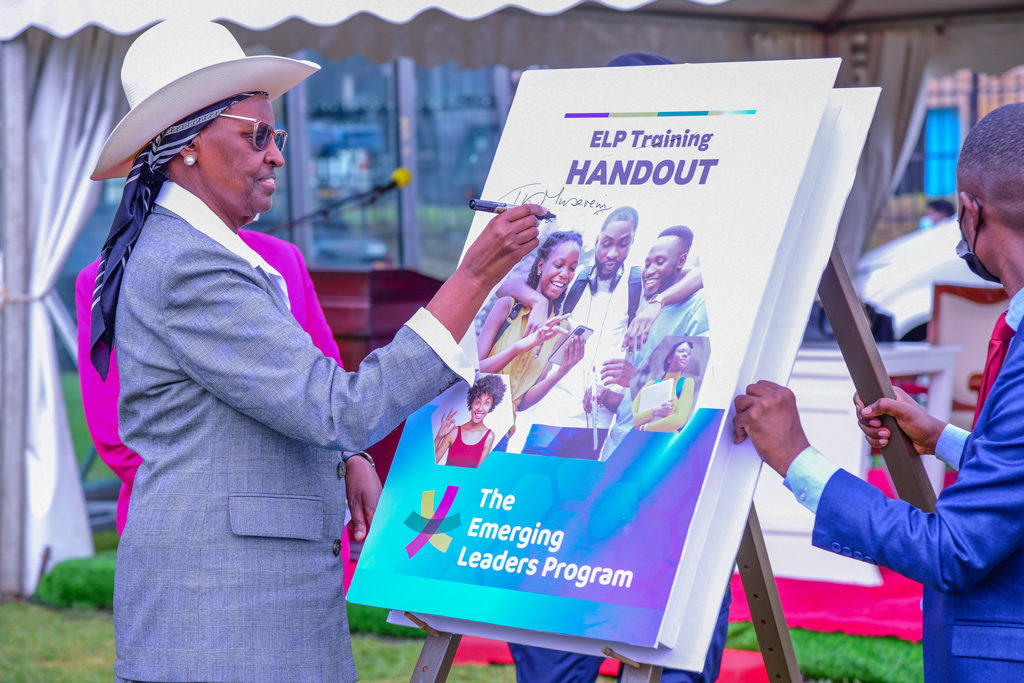
The First Lady and Minister of Education and Sports, Hon. Janet Kataaha Museveni, officially launched the Emerging Leaders Program and commissioned the first cohort of SAFE champions at Makerere University on Friday 27th September 2024.
“It gives me great pleasure to commission you as Emerging Leaders Program Champions. I charge you to become role models. Please take the training that you have received as your moral campus at the University and beyond,” said Hon. Janet Museveni amidst applause from the audience.
The launch, held at Makerere University’s Freedom Square, was attended by notable figures including the Chairperson of the University Council- Mrs. Lorna Magara, Deputy Chairperson of Council- Rt. Hon. Dan Fred Kidega, the Vice Chancellor-Professor Barnabas Nawangwe, Program Chairperson-Professor Henry Alinaitwe, Co-Chair- Mrs. Barbara Kaija, and Bishop Joshua Lwere-Board Chair of the Global Leadership Summit.
The formulation of the Emerging Leaders Program followed a discussion between Hon. Janet Museveni and Makerere University Council members held on February 2, 2023. Burdened by the challenges that were being faced by students and the disastrous effects of addiction to alcohol, drug and substance abuse, corruption, HIV/AIDS, the First Lady and Hon. Minister of Education and Sports tasked the University Council headed by Mrs. Lorna Magara to partner with her and come up with a solution to save the students and young people from destruction.
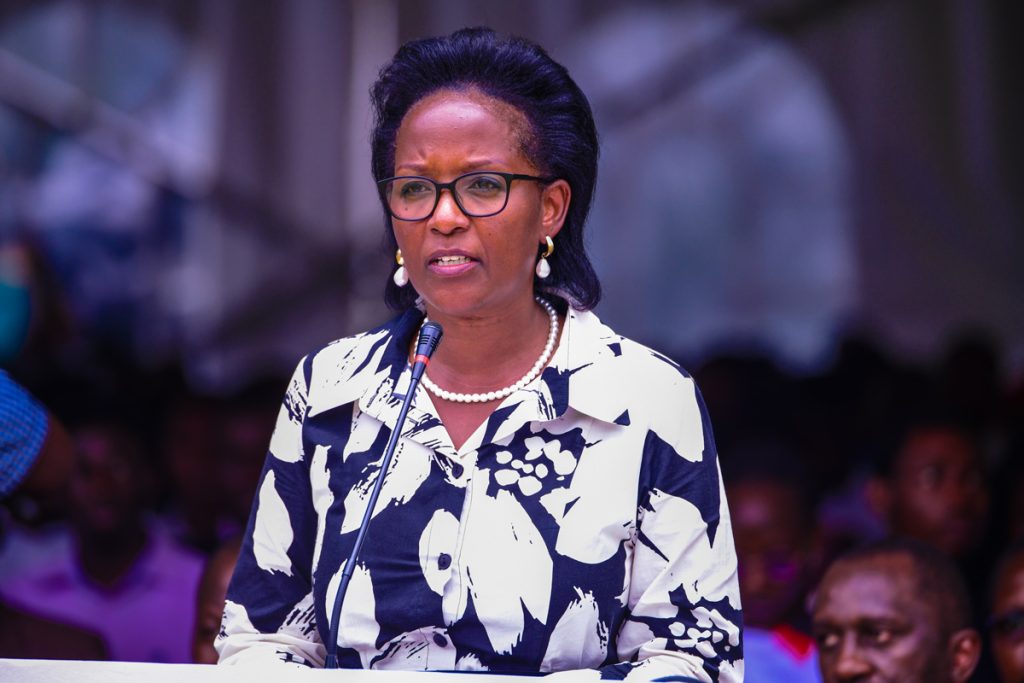
The launch of the Emerging Leaders Program at Makerere University, therefore marked the beginning of the actualization of Hon. Janet Museveni’s vision to implement a national Anti-Corruption and HIV/AIDS campaign in Uganda. The SAFE campaign stands for Sexually Fortified, Addiction Free, Financially Faithful and Education Focused.
Speaking at the launch, Hon. Janet Museveni said the Emerging Leaders Program is an initiative that she holds dear in her heart because it has the potential to nurture the young generation and shape the destiny of our nation.
“My desire is that this program expands beyond Makerere University to all universities in Uganda. I pray that God will make that possible,” she said.
The Minister credited the leadership of Makerere University and the program’s partners namely the Global Leadership Summit and Life Ministry Uganda for taking up the challenge to craft the Emerging Leaders Program that will instill character in university students throughout the country.
The Emerging Leaders Program is a life skills capacity-building and behavioral intervention coded “The SAFE Campaign.” The initiative seeks to address critical challenges threatening students’ education and well-being such as addiction to drugs, corruption, substance abuse, gambling, and the risks of HIV/AIDS. These issues were viewed as not only jeopardizing students’ health and academic performance, but also affecting the social well-being of graduates entering the workforce.
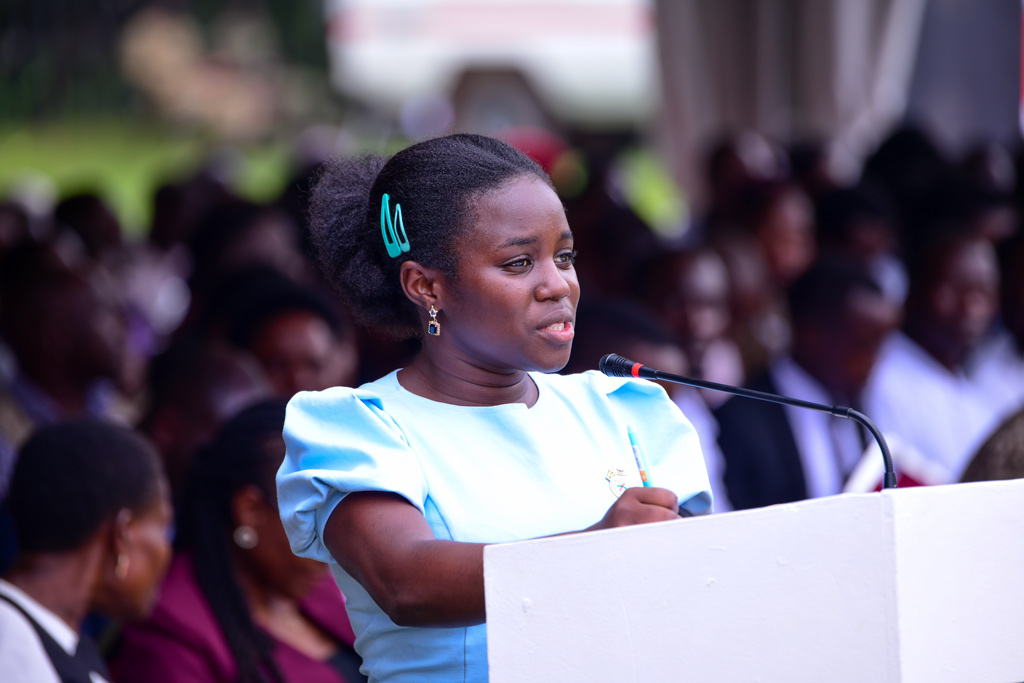
According to Mrs. Barbra Kaija, the Co-Chair of the Emerging Leaders Program, this was intended to help the parents who risk a lot to educate their children so that they become important and resourceful people, but sometimes disappoint them when they engage in harmful practices which eventually threaten their education and future.
“Parents take a lot of risks to educate their children, and when your child reaches a University level, you always want to see him or her succeed and become an important person, therefore what we are trying to do is to remove those barriers which are stopping them from becoming important people,” she said.
“Through this emerging leaders program, we can help shape the new generation. What we do in this program is that; we interact with these students and talk to them, teach them, and invite experts in these fields to share ideas,” she added.
Mrs. Kaija mentioned that the Emerging Leaders Program focused on Universities because university students are the most productive and as such, we must ensure their safety.
“University students are at the most productive age, and the workforce that is building our country, so we must make sure that they are safe. The emerging leaders program will help them in character development. While our students graduate with academic degrees, they need the right set of values and character to succeed in life,” she emphasized.
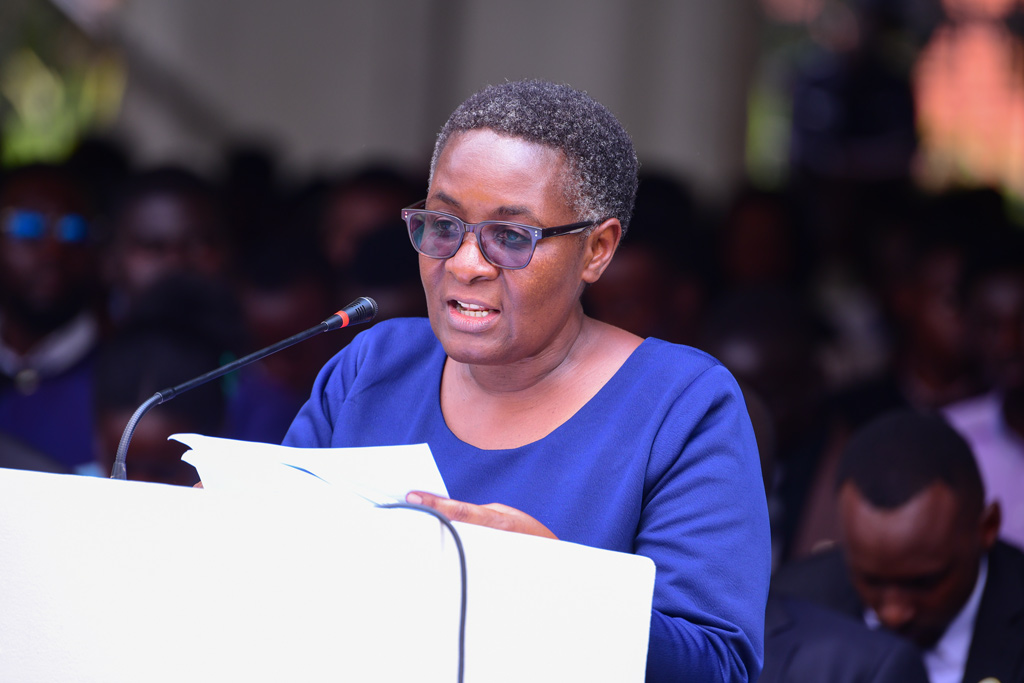
In her remarks, Mrs. Kaija informed the audience comprising students who filled the Freedom Square to capacity, Makerere University stakeholders and the media that the Emerging Leaders Program implementation team conducted a baseline study, which enabled them to understand the challenges that a few of the students at Makerere University were grappling with.
According to Mrs. Kaija, the Emerging Leaders Program team targeted 473 first year students and 1041 continuing students. Some of the vices include: achohol and drug abuse, sex before marriage, and betting primarily due to peer pressure. She noted that, although some results were worrying, they also registered some good news that they can build on.
Minister Janet Museveni said young people have been grappling with many challenges, some of which have been imposed on them because of peer pressure. She noted with concern, that gambling in the form of sports betting is also spreading very fast in Uganda.
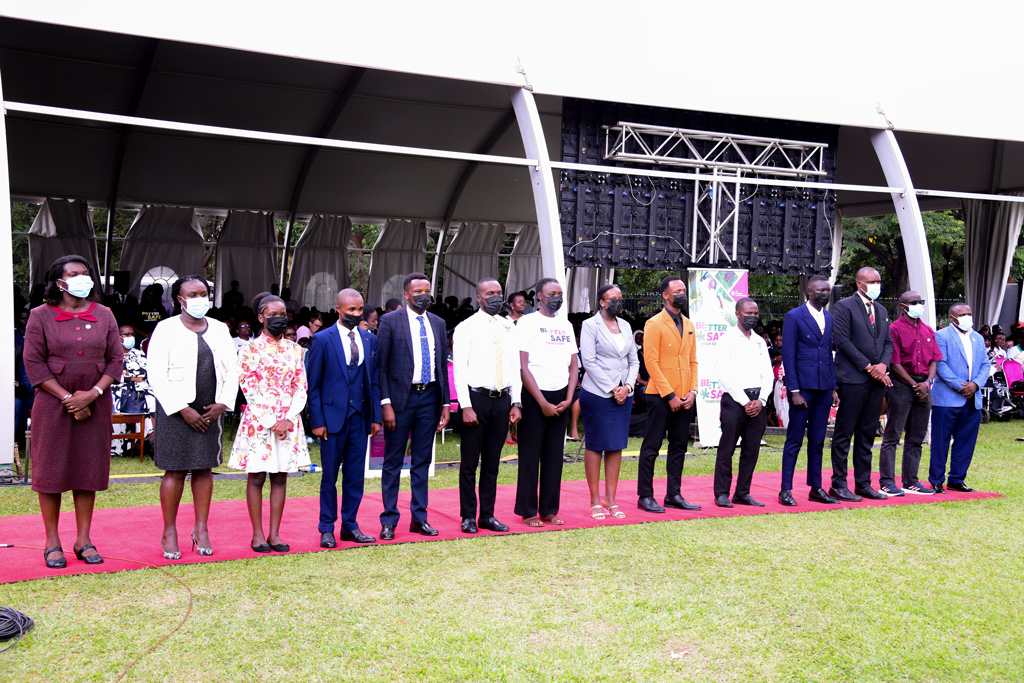
“Over the past few years, we have all experienced our young people grapple with many challenges such as alcohol, drug, and other substance abuse, sexual immorality, and gambling which has led to many university students dropping out. Through this program, we desire to help students rise above what has been the norm of negative peer pressure that compromises their innocence,” said the Minister.
The First Lady reiterated that the Emerging Leaders Program has the potential to engage the students and significantly save lives. The Program provides an inclusive process to nurture the young generation into impactful people by instilling values into them and improving their health. It provides life skills to enable students and youth in general to make the right choices while at the University, at places of work, in the communities and with their families.
“This program is not just about imparting leadership skills; it is about the total transformation of lives through instilling values. Furthermore, through this program young people are being prepared to make the right choices in life, that will safeguard their health and wellbeing while enabling them to succeed in their academics,” she said.
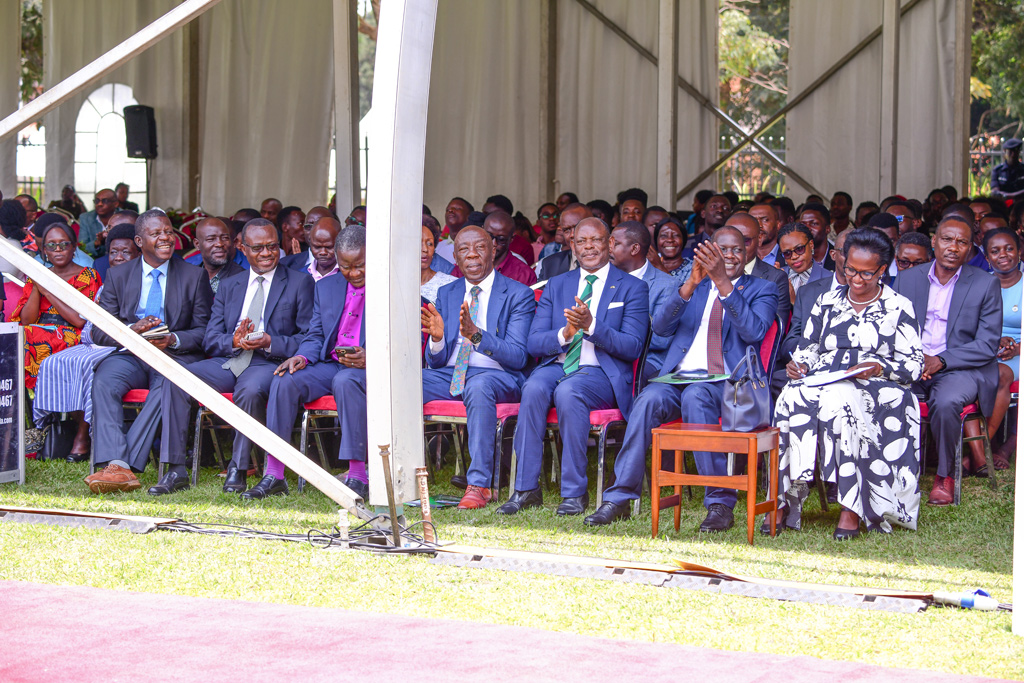
In the same vein, Mrs. Lorna Magara, the Chairperson of Makerere University Council said that the program will help to curb societal moral degradation and refocus our young people on values and life skills to secure their future.
She explained that the program is timely because the country and the continent’s development relies on the quality of its leaders.
“The development of Uganda and indeed Africa hinges on the quality of its people, therefore the Emerging Leaders Program is a strategic tool to this cause with a fully-fledged behavior change program, curriculum, and messaging campaigns,” she stated.
She also revealed that Makerere University Council had approved the developed Emerging Leaders Program mandatory course and students will be required to take it over three years of their study. The course will soon be presented to the University Senate for approval. Some of the short courses of the Emerging Leaders Program are ready to be rolled out.
The Vice Chancellor, Professor Barnabas Nawangwe commended the First Lady and Hon. Minister of Education and Sports for the initiative that is highly anticipated to reshape the future generation. Prof. Nawangwe also seized the opportunity to thank the First Lady for supporting the University’s infrastructure development initiatives.
“We thank you for the support towards the development of infrastructure at Makerere University particularly the reconstruction of the Main Building,” he remarked.
He appreciated Hon. Janet Museveni for championing the fight to save the emerging leaders from destruction and committed himself to ensure Emerging Leaders Program succeeds.
“Makerere University is committed to ensuring the safety of her students and staff. The University Council has approved the safeguarding policy, and the counselling and career guidance policy is in the offing. The University Management will make every necessary effort to ensure the success of the Emerging Leaders Program,” he said.
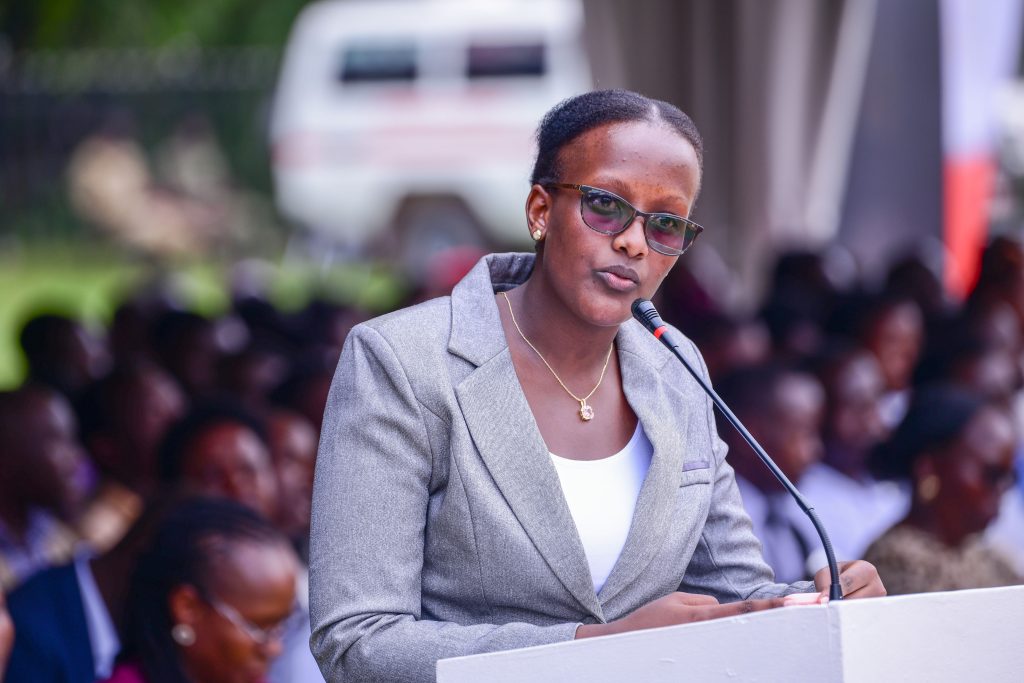
Prof. Nawangwe acknowledged the Students’ Guild leadership for their contribution towards the success of ELP noting that; “The Guild Leadership has implemented activities that complement the efforts of the Emerging Leaders Program.” He also appreciated Prof. Henry Alinaitwe, the Chair of the Emerging Leaders Program, Mrs. Barbra Kaija, the Co-Chair and the entire implementation team for accepting to serve.
Dr. Ronald Semyalo, a Lecturer in the department of Zoology at the College of Natural Sciences and one of the Emerging Leaders Program trainees, noted that the Emerging Leaders Program is not just another academic course, but a catalyst for personal transformation, empowering each individual to reach their full potential for the betterment of themselves and the community.
Ms Julian Kanyesigye, a student of Makerere University studying Bachelor of Science in Quantitative Economics, and one of the SAFE champions, noted that the Emerging Leaders Program has come at a time when youth are battling pandemics on multiple fronts from high rates of drug abuse to high rates of sexual immorality, with an alarming increase in the number of HIV infections among young people.
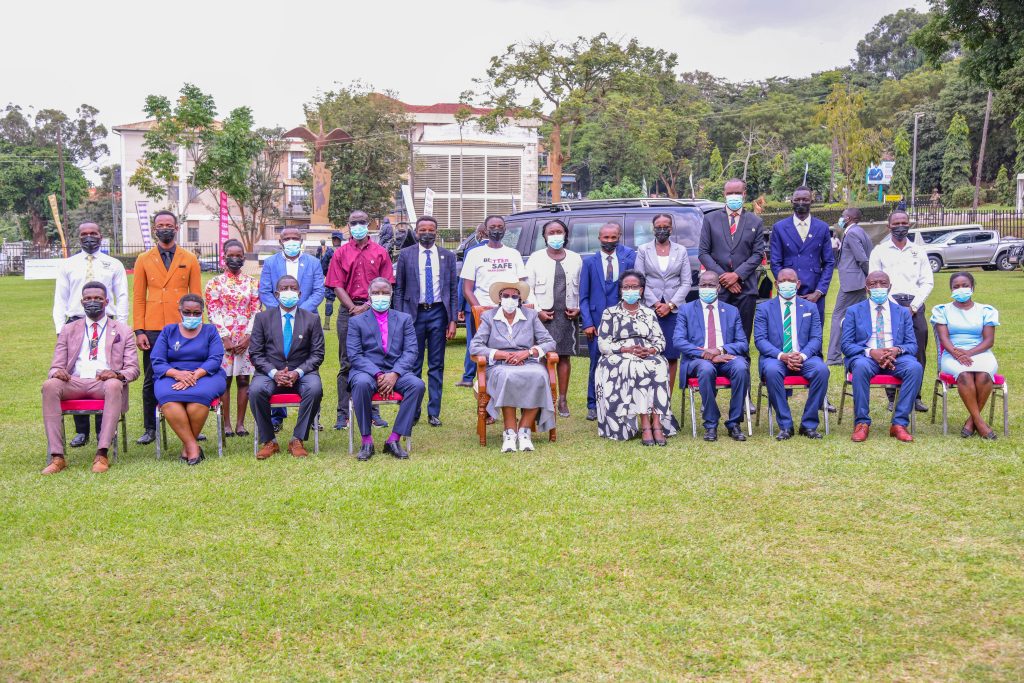
With the Emerging Leaders Program being student centred, the audience listened to a poem titled “For God and My Country,” recited by two Makerere University Students namely Grace Deborah Mirembe and Paul Tumwesigye studying Literature and English Language Studies from the College of Education and External Studies. The poem calls on students and young people to focus on the values which emphasize the need to uphold good character, humanness, knowing to say NO and when to say YES for the good of the individual and the whole society.
In addition, the students from the Department of Performing Arts and Film, which is headed by Dr. Benon Kigozi captivated the audience with beautiful melodies and sounds. The Department of Performing Arts and Film is under the College of Humanities and Social Sciences.
You may like
General
Makerere Explores Strategic Industry Partnership with Psalms Food Industries to Strengthen Manufacturing Innovation
Published
17 hours agoon
March 4, 2026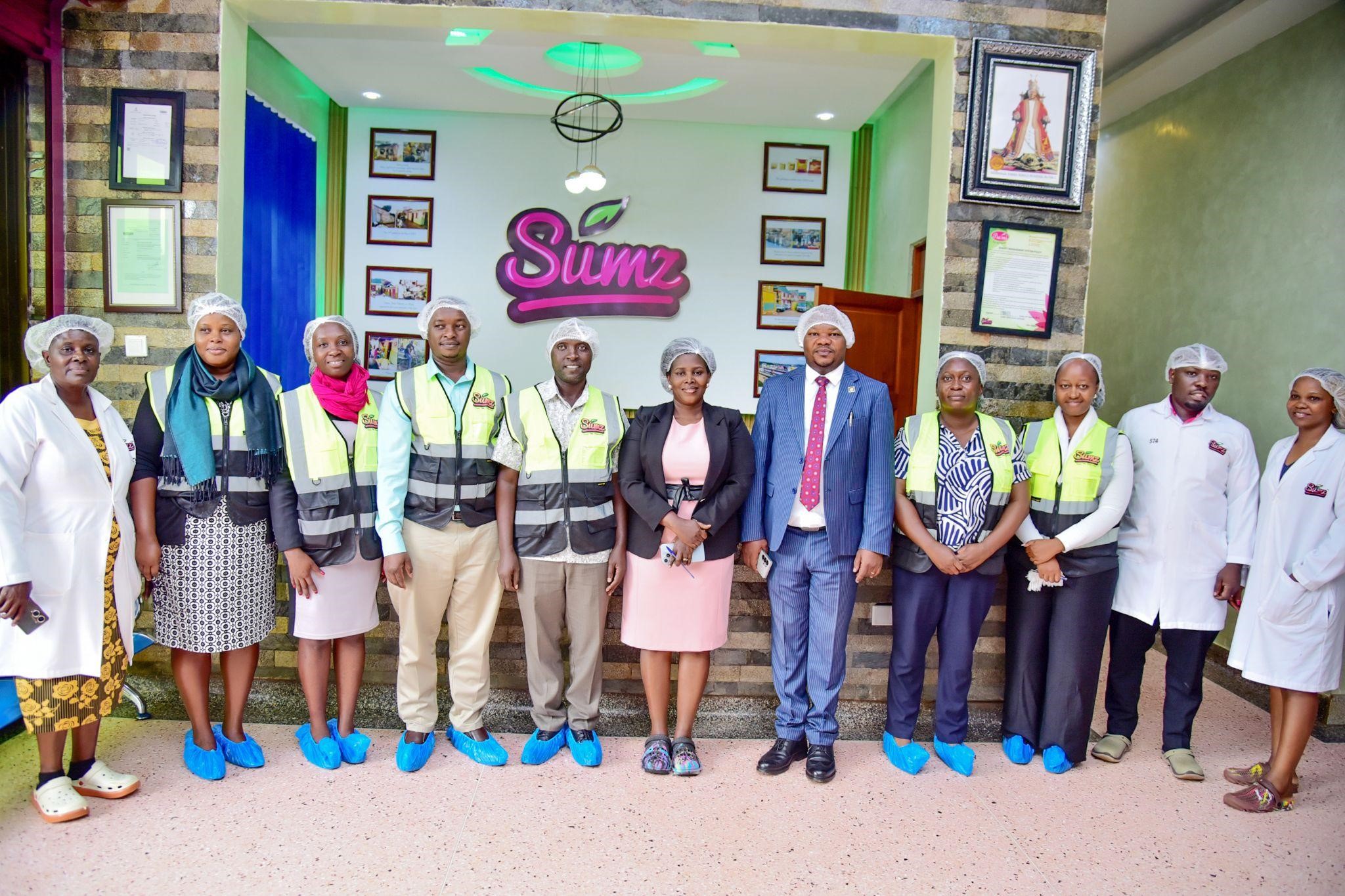
On 2nd March, 2026, representatives from the Advancement Office, the College of Business and Management Sciences and the University Innovation Pod visited Psalms Food Industries to discuss a prospective partnership aimed at strengthening university–industry collaboration in manufacturing, research, innovation, and skills development.
Psalms Food Industries, a homegrown snacks innovation and manufacturing company, operates three major brands, namely, Sumz, Afrikan Harvest and Krunchables, which have grown to a range of 37 products and target the introduction of five new products annually. The company distributes products across Kenya, Rwanda, the Democratic Republic of Congo, South Sudan, and, recently, Tanzania. As a labour of love, the idea of producing snacks was born during the honeymoon of Mr and Mrs Ngabirano, who now run Psalms Food Industries side by side.
Dr. Denis Ngabirano, CEO and Co-Founder of Psalms Food Industries, during the meeting, described the company as “a snacks innovation house, with all our products developed in-house.” He noted.
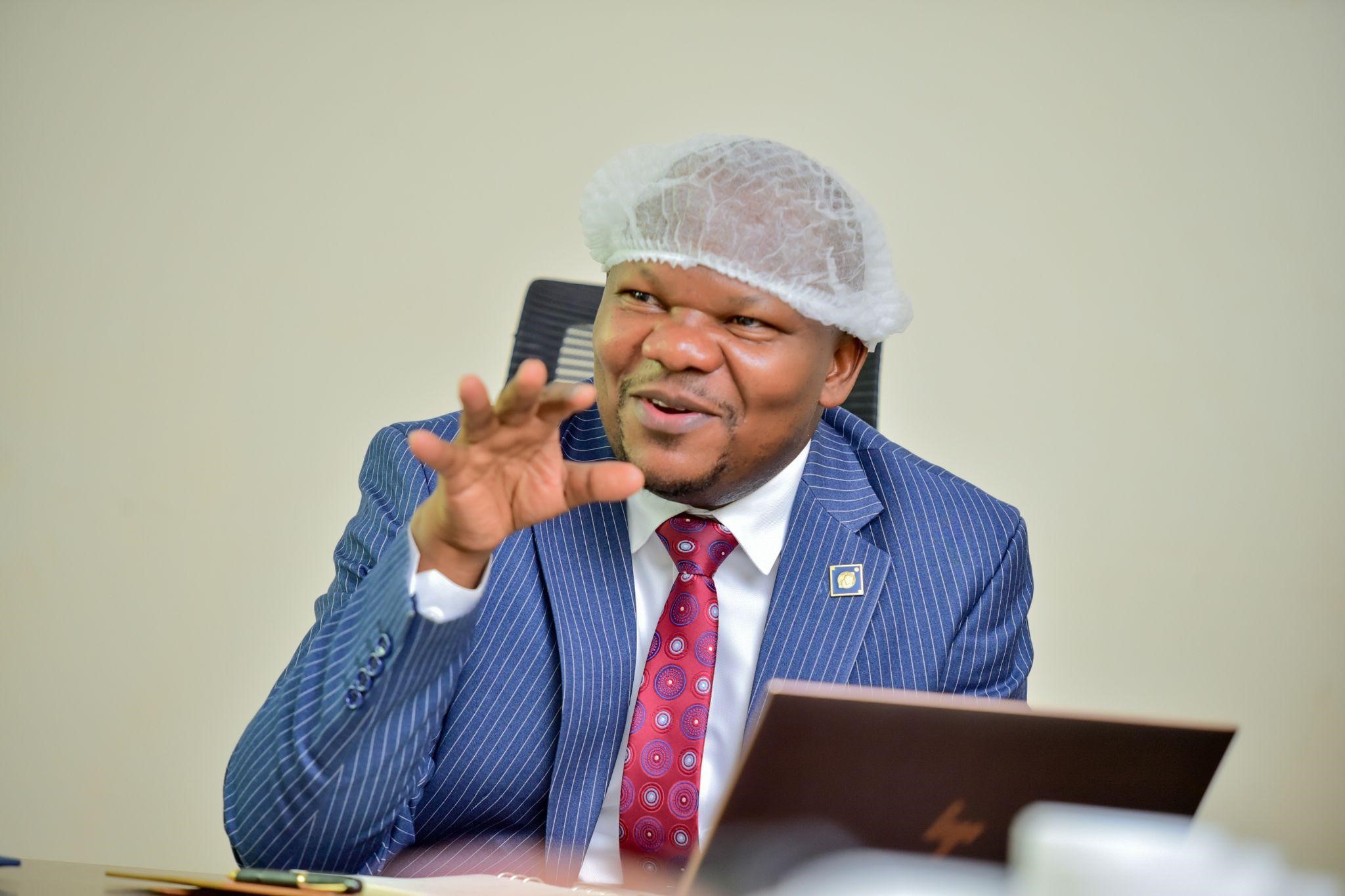
He emphasised the company’s commitment to quality assurance and consumer-centred research, noting that Psalms conducts surveys and gathers customer feedback to inform product development, supported by an internal microbiology and chemistry laboratory.
Dr. Denis Ngabirano noted that the company had only recently introduced two brands, “Afrikan Harvest for it’s health conscious clientele and Kruchables for it’s volume centric clientele.
“Afrikan Harvest has no additives, it is a brand for health-focused consumers,” he explained, while highlighting the differentiated positioning of their product lines. “Sumz is our premium brand, and Krunchables focuses on volume.”
Student-Centered Experiential Learning
A key focus of the meeting was structured experiential learning for students across disciplines. Potential areas of collaboration include internships, graduate trainee pathways, and hands-on exposure within Psalms’ incubation and production facilities.
The proposed engagement spans multiple fields, including environmental sciences, engineering, procurement and logistics, finance and accounting, quality control, production and manufacturing, human resource management, marketing, and international business.
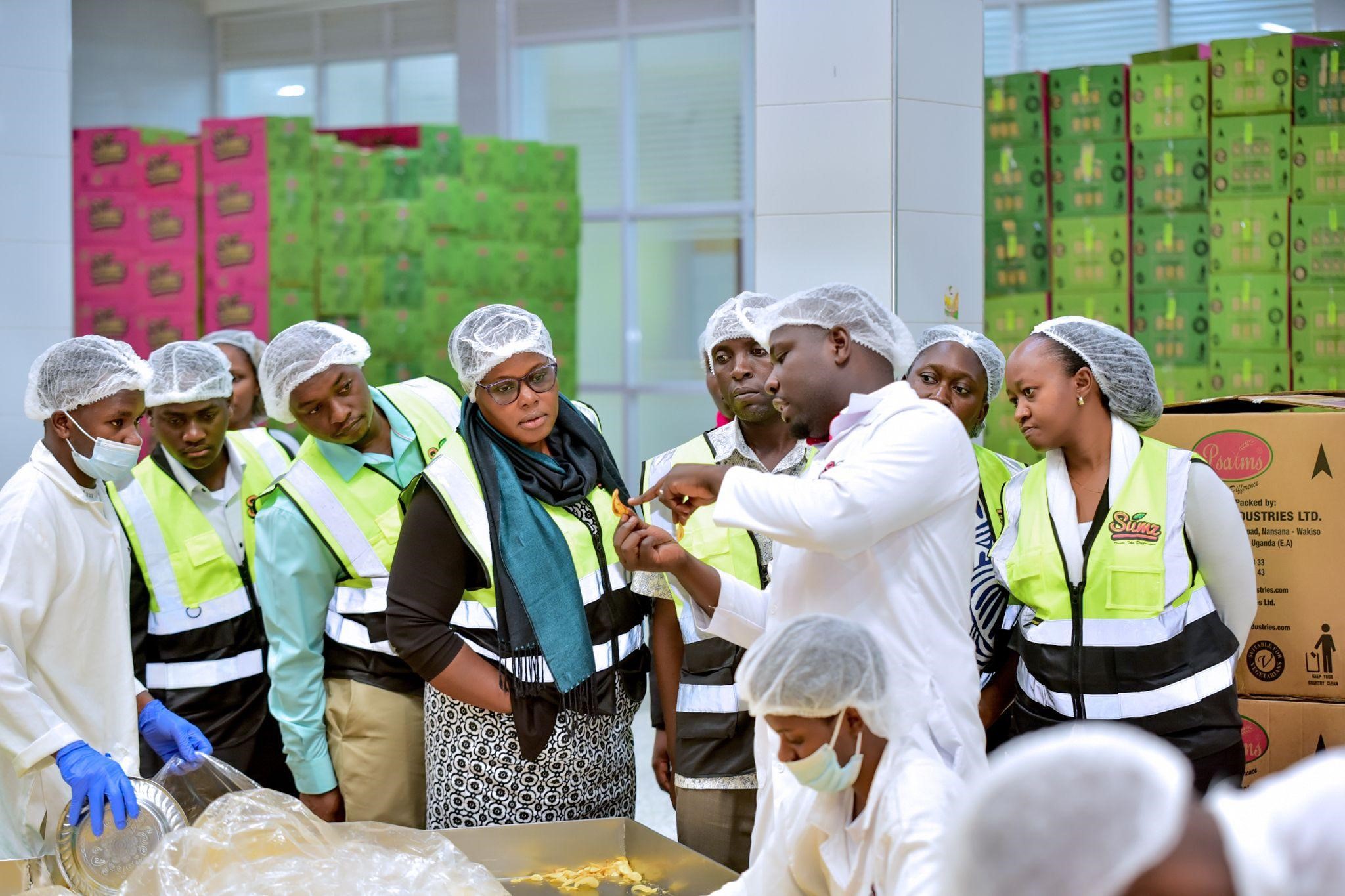
The partnership could provide students with direct exposure to real-time production systems, standard operating procedures (SOPs), and quality assurance frameworks, strengthening the practical relevance of their academic training.
Among the innovative ideas discussed was a potential competition involving students from the Fine Art and Industrial Design disciplines to redesign packaging for selected Sumz products. The proposal would allow top designs to be commercially adopted, creating a direct bridge between creativity, intellectual property development, and industrial application.
Research, Innovation and Commercialisation
Both institutions expressed interest in joint applied research initiatives, particularly in process optimisation, data analytics for manufacturing efficiency, product improvement, and sustainable production systems.
Opportunities were also discussed around collaborative research in machine design, crop development for snack processing, and factory energy solutions, areas that not only benefit Psalms but have broader implications for Uganda’s manufacturing sector.
The engagement further highlighted potential linkages with the University’s innovation and commercialisation structures, including the University Innovation Pod (UNIPOD), to support co-creation and scaling of student-led innovations.
Mr Awel Uwihanganye, Chief Advancement Officer at Makerere University, proposed strengthening the engagement through structured programming, including a planned collaboration between the University’s innovation Hub and the upcoming incubation Hub at Psalms Food Industries, particularly to support the commercialisation of research outcomes for both students and staff.
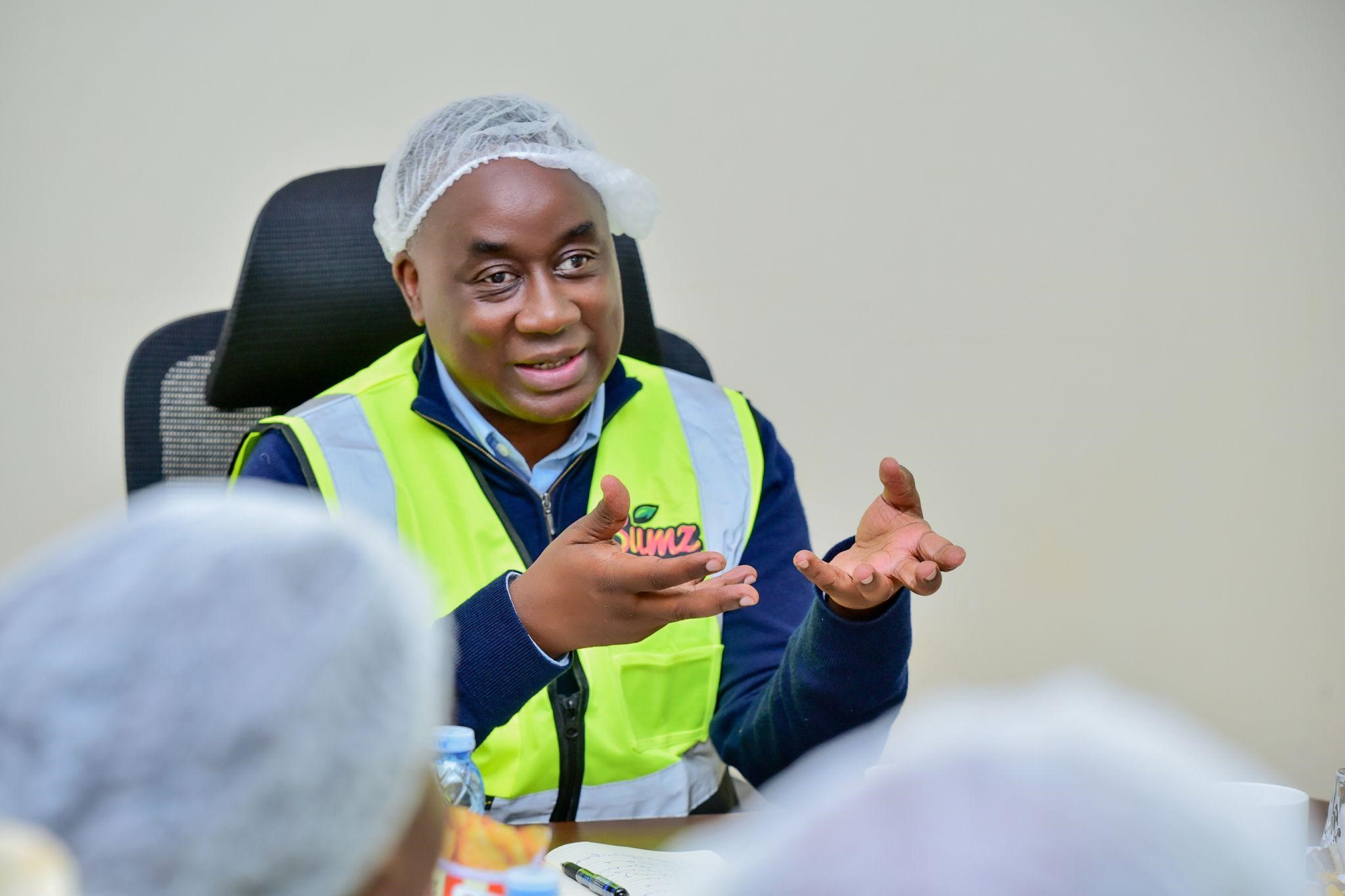
Curriculum Co-Creation and Staff Exchange
Beyond student placements, discussions also focused on co-developing academic content that responds more directly to industry needs, particularly within the manufacturing value chain.
Proposals included guest lectures by industry practitioners, staff exchange programmes to expose academic staff to factory operations, and tailored short courses for Psalms staff based on identified skills gaps.
Dr. Jude Mugarura, Head of the Department of Marketing and Management at COBAMS, emphasised the importance of embedding the partnership within academic programming. He proposed “internships for students in HR, marketing, international business, accounting and finance,” as well as staff exchanges to give University staff hands-on exposure to manufacturing operations.
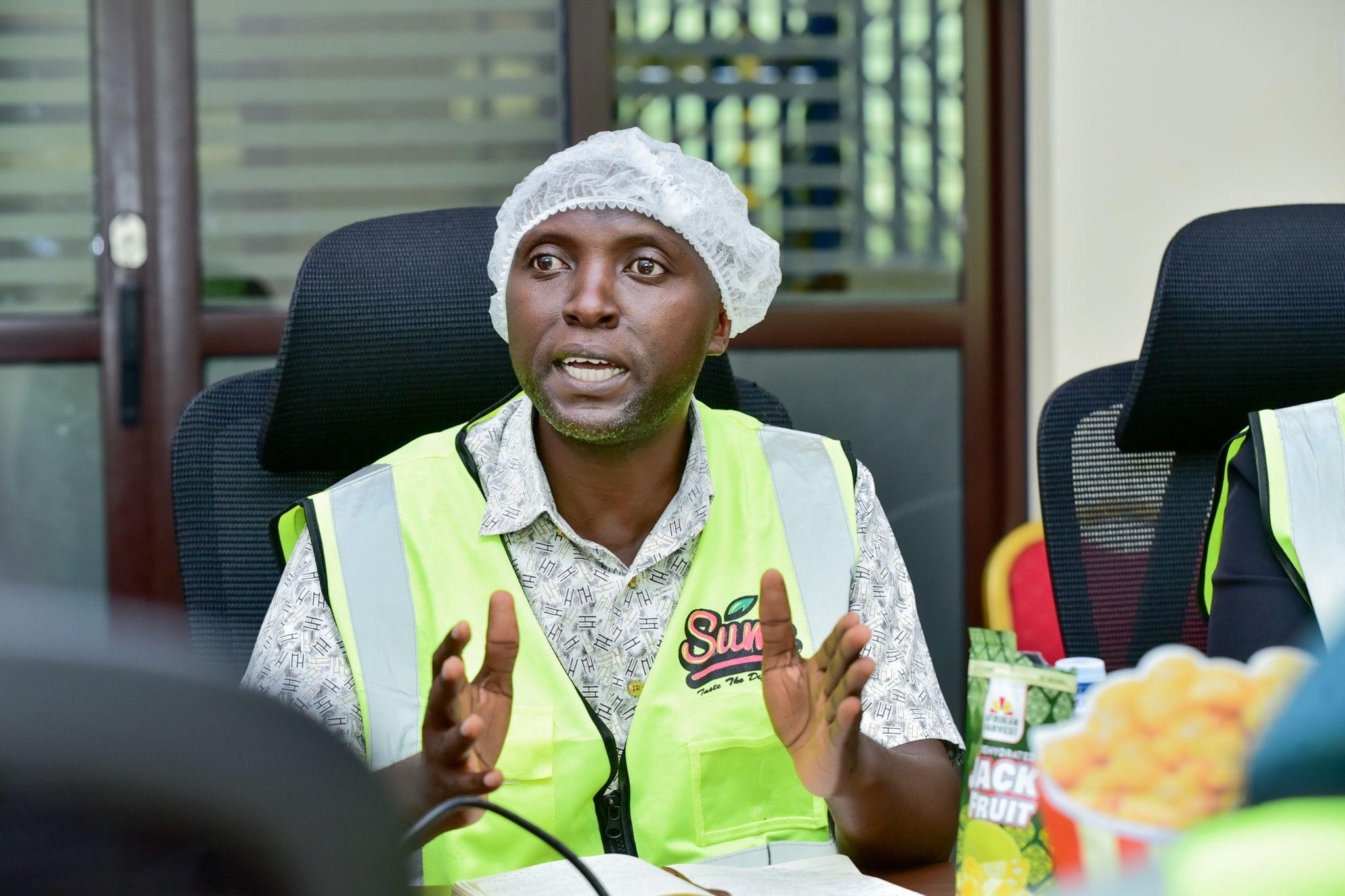
He further suggested specialised courses tailored to the factory’s needs and attachment of research students interested in manufacturing. Such collaboration would contribute to curriculum responsiveness and ensure that graduates are equipped with market-relevant competencies.
Strengthening University–Industry Linkages
The engagement reflects Makerere University’s continued commitment to strengthening partnerships that bridge knowledge generation and real-sector application.
Both institutions expressed a shared vision of building a structured, mutually beneficial collaboration that integrates research, innovation, skills development, and enterprise growth, positioning the University as a key knowledge partner in Uganda’s manufacturing transformation.
Discussions remain ongoing as both parties refine priority areas for formalisation.
Caroline Kainomugisha is the Communications Officer, Advancement Office.
General
Makerere University commemorates 13 transformative years of partnership with Mastercard Foundation
Published
3 days agoon
March 2, 2026
On Friday, 27th February 2026, Makerere University proudly celebrated 13 years of a significant partnership with the Mastercard Foundation, a prestigious independent organisation headquartered in Toronto, Canada. Since its inception in 2013 with the launch of the Scholars Program-currently headed by Prof. Justine Namaalwa, this collaboration has grown significantly, expanding to include two additional initiatives: The E-learning Initiative-headed by Prof. Paul Muyinda Birevu and the Africa Climate Collaborative-headed by Prof. Gorretie Nabanoga. This long-term partnership underscores the shared commitment to fostering education, innovation, and sustainability in Uganda and across Africa.
The colourful event coincided with the 76th Graduation Ceremony, during which Makerere University honoured Ms. Reeta Roy, the Founding President and CEO of the Mastercard Foundation, with an honorary Doctor of Laws.

In her commencement speech, Ms. Roy thanked Makerere University for considering a partnership with the Mastercard Foundation and for conferring upon her a prestigious honorary award.
“Mastercard Foundation is honoured to collaborate with this esteemed university, and I appreciate the recognition through this award. I am excited to be associated with Makerere University and look forward to actively embodying its values. Joining the broader community of alumni from this distinguished institution is a privilege, and I am eager to contribute to its legacy,” stated Ms. Roy.

During the reception in honour of Ms. Roy, the Chairperson of Makerere University Council, Dr. Lorna Magara, acknowledged the invaluable support from the Mastercard Foundation. She emphasised the profound impact of the Foundation’s various initiatives, particularly the scholarships for disadvantaged youth, which enable them to access higher education and opportunities that might have otherwise been beyond their reach.
“On behalf of the Makerere University Council and the broader University community, I extend our sincere gratitude to Mastercard Foundation for its commitment to collaborating with Makerere University in various endeavours, especially for providing scholarships to our underprivileged young people who would never have stepped inside a lecture room at the University.” Dr. Magara stated.

Dr. Magara, in a special way, thanked Ms. Roy for her transformative leadership and unwavering commitment to supporting young people in Africa, citing her efforts to ensure young people get their voices heard.
“As a university, our business is with young people. We are therefore committed to providing the environment and education that deliver meaningful pathways. We will provide an environment that ensures young people have a voice and agency to create meaningful change in society.” Dr. Magara pledged.

Dr. Magara further congratulated Ms. Roy on her honorary Doctor of Laws from Makerere University, noting that it is the university’s highest honour for individuals who have excelled in their careers.
“On behalf of the Makerere University community, I would like to extend my heartfelt congratulations on your honorary Doctor of Laws. This esteemed recognition represents the highest honour our institution can bestow on individuals who have demonstrated exceptional achievement and excellence across various facets of their career.” Dr. Magara remarked.
Prof. Justine Namaalwa, the Program Director of the Mastercard Foundation Scholars Program and the Coordinator for all Mastercard Foundation Initiatives at Makerere University, expressed her appreciation for the thirteen-year collaboration between Makerere University and the Mastercard Foundation. She highlighted that the partnership had yielded significant, impactful results.

“In 2013, Makerere University partnered with the Mastercard Foundation to educate the next generation of transformative African leaders who can positively impact their lives, their communities, and the economies of Africa. The partnership has had a significant impact. I thank the University Management and the Foundation team for this visionary collaboration,” remarked Prof. Namaalwa.
Prof. Namaalwa articulated that the partnership with the Mastercard Foundation is primarily focused on empowering young people as agents of change for transformational leadership in Africa. She presented compelling statistics demonstrating the positive impact of the scholars’ program, highlighting the success of individuals who have completed their education and their subsequent professional experiences after university graduation.

“This partnership focuses on young people, aiming to create positive change in their lives. To date, the Scholars Program has graduated 974 alumni, with 48% securing formal employment, 18% starting their own businesses, 8% participating in internships, and 5% pursuing further education. Overall, 72% of Scholar alumni are actively engaged in employment or entrepreneurship,” Prof. Namaalwa stated.
The colourful event showcased a dynamic array of activities that highlighted the entrepreneurial spirit of Scholars and alumni from the Mastercard Foundation at Makerere University. Attendees enjoyed a mini-exhibition featuring innovative products from these ventures.

A video documentary illustrated the positive impact of the three Mastercard Foundation initiatives. The event also featured inspiring poetry recitations by Scholars and a lively atmosphere of music and dance, creating an engaging and memorable experience for all participants.
The high-level event was attended by senior University officials, led by the Chairperson of Council, Dr. Lorna Magara; the Vice-Chancellor, Prof. Barnabas Nawangwe; the Vice-Chancellor, Academic Affairs, Prof. Sarah Ssali, Deputy, and the Ag. Deputy Vice-Chancellor, Finance and Administration Prof. Winston Tumps Ireeta. Mr Yusuf Kiranda, the University Secretary; and Prof. Buyinza Mukadasi, the Academic Registrar, Chancellor Emeritus-Prof. Ezra Suruma, former Chairperson of the Steering Committee of Mastercard Foundation Scholars Program-Prof. Umar Kakumba, and the Deputy Executive Secretary, RUFORUM, and former Program Coordinator of the Scholars Program at Makerere University-Dr. Florence Nakayiwa, among many other officials graced the function.

The event was also graced by a high-level delegation from the Mastercard Foundation, led by Ms. Reeta Roy, the Founding President of the Foundation, and included the Mastercard Foundation Teams from the Country offices in Kigali, Nairobi, and Kampala; the Program partners; the Mentors, Scholars and alumni; as well as the Program staff of the three Mastercard Foundation Initiatives at Makerere University.
At the end of the event, Makerere University honoured Ms. Reeta Roy with University memorabilia, including a pencil-drawn portrait, a pencil-drawn photo of the Ivory Tower, and other Ugandan crafts. Ms. Roy cut a graduation cake together with the 10 graduates of the 76th graduation ceremony from the Mastercard Foundation Scholars Program.
Bernard Buteera is the Principal Public Relations Officer for the Mastercard Foundation Scholars Program at Makerere University.

It is with great pleasure that I welcome you to this edition of Mak News Magazine, a publication that continues to chronicle Makerere University’s journey as a centre of academic excellence, innovation, and societal transformation.
The stories featured in this issue vividly demonstrate Makerere’s unwavering commitment to addressing national, regional, and global challenges through research, partnerships, and people-centred solutions. They reflect a university that is deeply engaged with society, one that applies knowledge not only to advance scholarship, but also to improve lives.
A recurring theme in this edition is innovation for resilience and inclusion. From the College of Agricultural and Environmental Sciences’ Healthy Soy Initiative combating child malnutrition amid climate change, to the cutting-edge work of CEDAT’s Team Green Minds integrating IoT into agriculture, Makerere continues to harness science and technology to respond to pressing development needs. Equally inspiring is the College of Natural Sciences’ success in securing international funding to scale up fish processing technologies, with a deliberate focus on empowering women and strengthening livelihoods.
This issue also highlights Makerere’s growing role in advancing health and wellbeing. The launch of the Early Intervention Psychiatry Services Clinic at Makerere University Hospital marks an important step in strengthening mental health services, while the Hospital’s transformation from a modest sickbay into a centre of excellence stands as a testament to decades of strategic investment, dedication, and service to the nation.
Our commitment to education access and global engagement is equally evident. Strategic partnerships, such as that between the College of Education and External Studies and the Uganda Vocational and Technical Assessment Board, are expanding pathways to quality education. The establishment of the first-ever United States Studies Centre in the Great Lakes Region positions Makerere as a hub for dialogue, research, and policy engagement on global affairs. We also celebrate our vibrant international community, with graduates drawn from 67 nationalities—affirming Makerere’s status as a truly global university.
This edition further showcases initiatives that ensure long-term institutional sustainability, including the launch of the CoCIS Endowment Fund, infrastructure developments such as the modern hostel at Buyana Farm, and transformative programmes supported by the Mastercard Foundation that continue to empower young people across the continent.
As you read through these pages, I invite you to reflect on the collective effort of our students, staff, alumni, partners, and supporters whose contributions make these achievements possible. Together, we continue to shape Makerere University as a place where knowledge serves humanity.
I wish you an engaging and inspiring read.
Prof. Barnabas Nawangwe
VICE CHANCELLOR
Trending
-

 Humanities & Social Sciences1 week ago
Humanities & Social Sciences1 week agoMeet Najjuka Whitney, The Girl Who Missed Law and Found Her Voice
-

 General1 week ago
General1 week ago76th Graduation Highlights
-

 Agriculture & Environment2 weeks ago
Agriculture & Environment2 weeks agoUganda Martyrs Namugongo Students Turn Organic Waste into Soap in an Innovative School Project on Sustainable Waste Management
-

 Health2 weeks ago
Health2 weeks agoMakerere University School of Public Health Graduates First Cohort of Cost-Effectiveness Analysis Short Course
-

 Agriculture & Environment1 week ago
Agriculture & Environment1 week agoCAES Presents Overall Best Performing Student in the Sciences & a Record 28 PhDs at the 76th Graduation Ceremony
